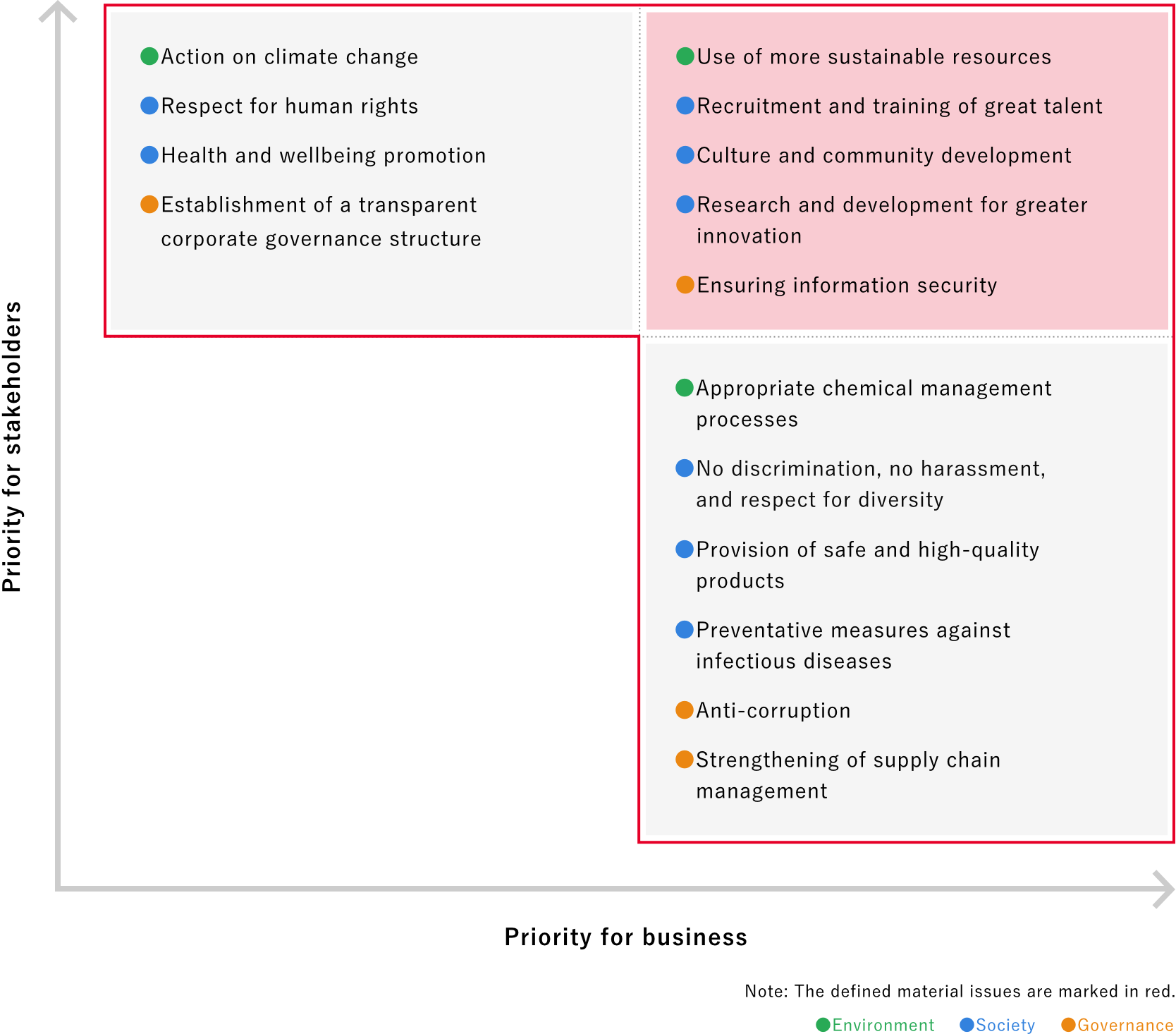MATERIALITY(KEY CORPORATE SUSTAINABILITY ISSUES)OF NORITSU KOKI GROUP
MATERIALITY
FRAMEWORK
In moving towards the realisation of a sustainable society,
the Noritsu Koki Group has identified 4 corporate materialities.
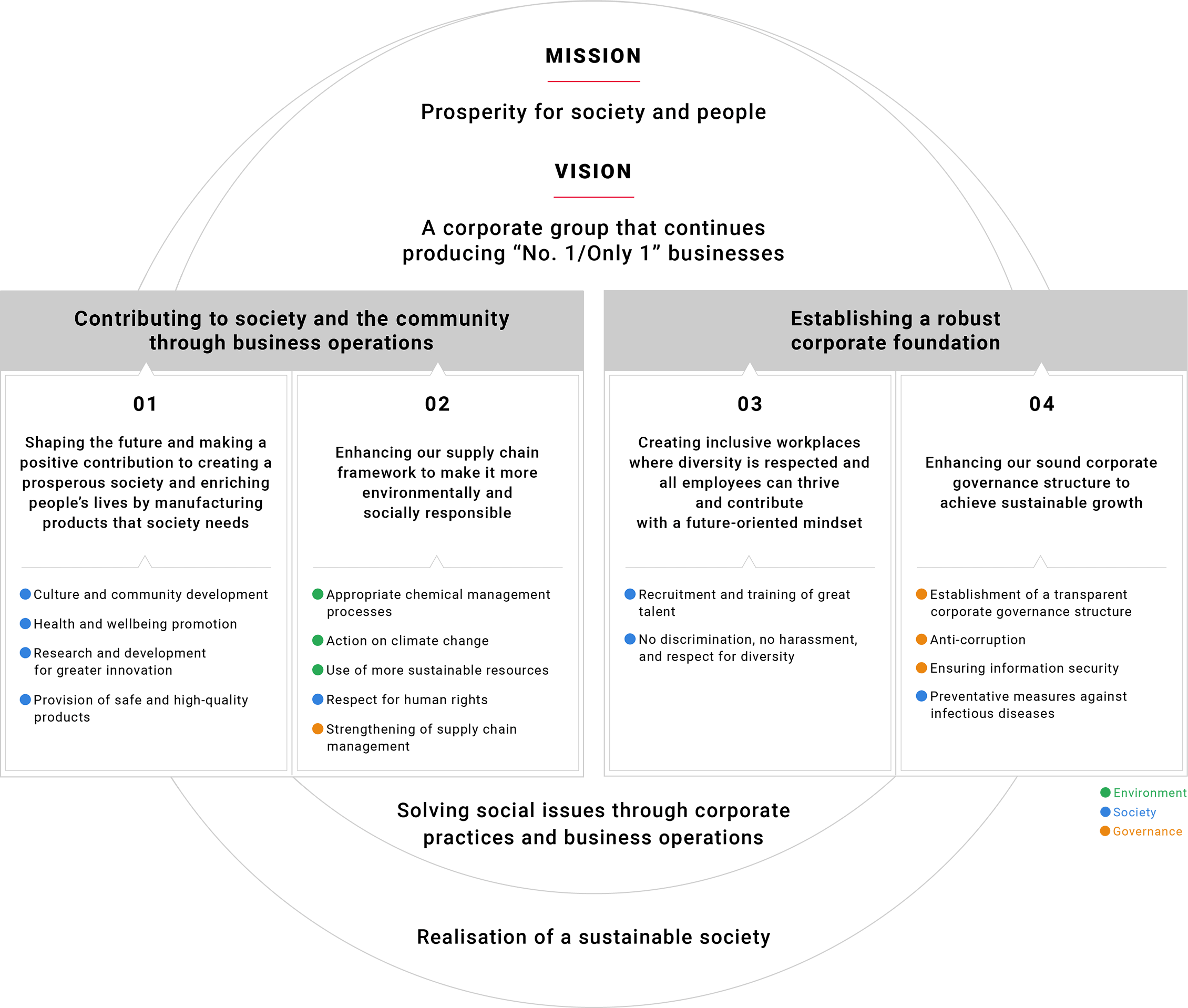

MATERIALITY
ACTION PLAN
We have set targets and developed a Materiality Action Plan
for achieving our identified material issues.
| Materiality | Relevant to | Our actions | Goals for FY2023 |
Achievements in FY2023 |
Plans for FY2024 |
|
|---|---|---|---|---|---|---|
|
Contribution to society and community through business operations
|
01
Shaping the future and making a positive contribution to creating a prosperous society and enriching people`s lives by manufacturing products that society needs
|
TB・AT・JL | Promoting and enhancing quality management | Monitor Group response to customers regarding quality issues | Monitored Group response to customers regarding quality issues |
|
| TB・AT・JL | Investing in R&D to create new technologies and value | R&D investment of ¥4.0 billion | Invested ¥3.9 billion in R&D |
|
||
| NK・TB・AT・JL | Supporting local communities and culture development closely linked to our businesses | - | Supported local communities and cultural development activities closely linked to our businesses | Carry out plans of supporting local communities and culture development at each company | ||
|
02
Enhancing our supply chain framework to make it more environmentally and socially responsible
|
TB・AT・JL | Delivering environmentally responsible products | Make efforts to be environmentally conscious throughout the entire lifecycle of products | Made efforts to be environmentally conscious throughout the entire lifecycle of products |
|
|
| NK・TB・AT・JL | Reducing greenhouse gas emissions (Scope 1,2,3) | Implement a greenhouse gas emissions reduction plan | Implemented a greenhouse gas emissions reduction plan |
|
||
| TB・AT・JL | Establishing our supply chain management framework and promoting risk mitigation | To inform all our key suppliers about our Procurement Policy |
|
|
||
|
Establishing a robust corporate foundation
|
03
Creating inclusive workplaces where diversity is respected and all employees can thrive and contribute with a future-oriented mindset
|
NK・TB・AT・JL | Securing health and safety at work places | Monitor the promotion of health and productivity management and address issues base on the results | Monitored the promotion of health and productivity management and identified issues to be addressed |
|
|---|---|---|---|---|---|---|
| NK・TB・AT・JL | Improving initiatives for developing talent, skills, a proactive mindset and leadership of employees at all levels | Provide an average of 22.4 hours of training per employee per year | Provided an average of 18hours of training per employee per year (80% achievement to the plan) |
|
||
| NK・TB・AT・JL | Respecting diversity and promoting more flexible ways of working |
|
|
|
||
|
04
Enhancing our sound corporate governance framework to achieve sustainable growth
|
NK | Enhancing Board effectiveness Promoting stakeholder engagements |
Address issues based on the FY2022 assessment results and continue to assess Board effectiveness | Addressed issues based on the FY2022 results and continued an assessment of Board effectiveness |
|
|
| NK・TB・AT・JL | Enhancing risk management framework and promoting risk mitigation | Integrated in #12 due to Materiality Action Plan revision | Carried out a risk assessment at each Group company |
|
||
| NK・TB・AT・JL | Fostering ethical corporate culture based on the Code of Conduct Responding to ESG-related laws and regulations |
Provide information security training once a year more | Carried out information security training (100% coverage*1) Carried out compliance training (100% coverage*1) |
|
- *1 All executives and employees at NKC, Teibow, AlphaTheta including part-time, temporary staffs and contractors (only permanent employees at soliton, Taibo and JLab, excludes long-term absentees at Teibow)
- *Company names indicated above are those as of March 2024.
- *Full names of the abbreviated company names are shown below.
NK:Noritsu Koki Co., Ltd.
TB:Teibow Co.,Ltd.
AT:AlphaTheta Corporation
JL:PEAG, LLC dba JLab
MATERIALITY ASSESSMENT PROCESS
We have identified our materialities by conducting our materiality assessment based on the
following processes with cross group co-operation and the help of external advisory experts.
social issues
and impacts
Working to incorporate diverse stakeholder expectations, we used 11 different globally-recognised sustainability standards such as ESG disclosure guidelines, evaluation criteria provided by ESG evaluation agencies, and codes of conduct. We performed an analysis on sector-specific material issues and identified 31 potential social issues that impact our business in order to define our materiality.
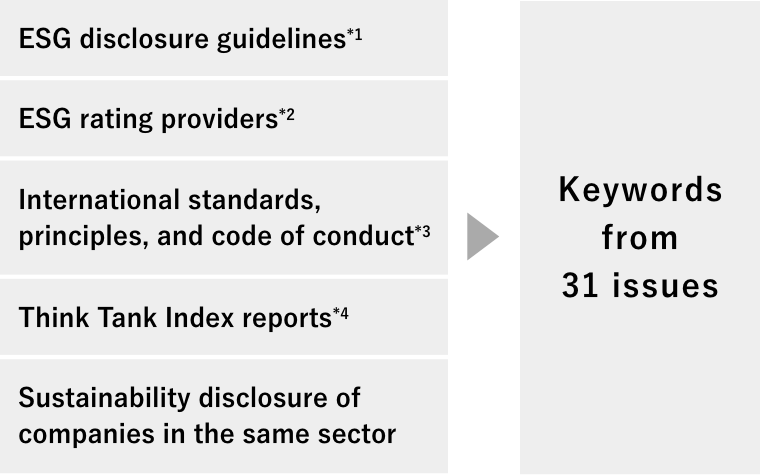
- *1 GRI Standards, SASB Standards
- *2 DJSI (RobecoSAM), FTSE, MSCI
- *3 SDGs, ISO26000, Ten Principles of the UNGC, OECD Guidelines for Multinational Enterprises
- *4 World Economic Forum(WEF)“Measuring Stakeholder Capitalism”, “Resolving Societal Issues Through Innovation — Listings of Societal Issues” FOR CO-CREATING THE FUTURE
prioritise material
topics
The 31 social issues selected in Step 1 were evaluated and weighted using a scoring method, incorporating the views of stakeholders and Group businesses, and prioritised according to the following criteria.
- 1) Stakeholder Input: assessment based on the relative interests and importance of stakeholders by external advisory experts and scholars.
- 2) Business Impact and Values: reassessing the evaluation scores provided by our 4 major group businesses based on the business impact and values of the Noritsu Koki Group.
As a result, we identified 15 social issues that matter the most to our business and stakeholders.
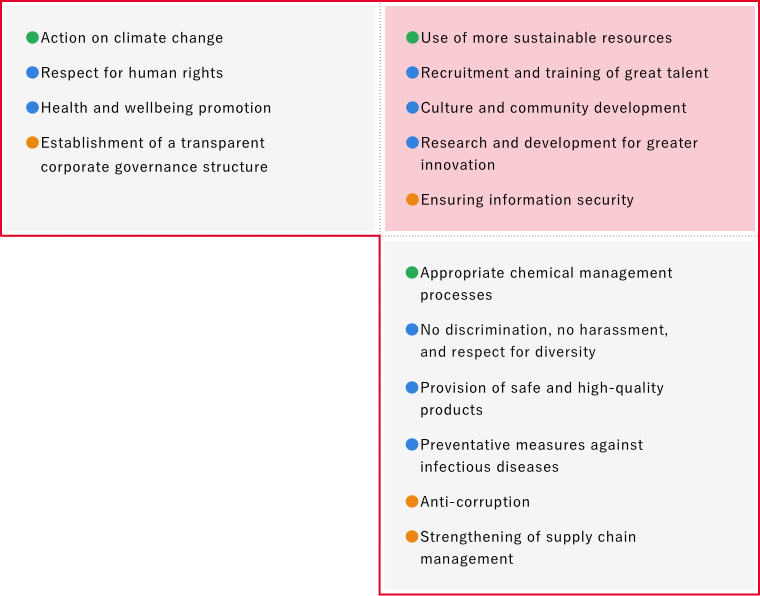
The 15 potential social topics selected in Step 2 were clustered into groups on the basis of our MVV and business model. We refined a list of core corporate material issues that could highly affect our business.
Having had insightful feedback from external advisory experts and far-reaching discussions with senior management including our CEO, we integrated them into 4 significant material topics that need to be addressed and worked on as a group.
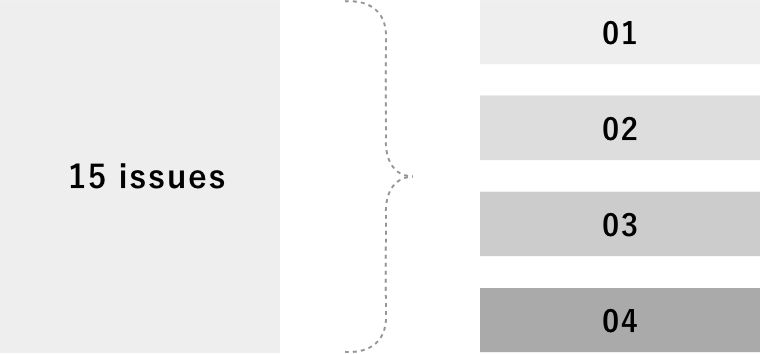
disclose the
materiality
We designed a materiality matrix and validated the credibility of the identified 4 material issues. Approved by the Board of Directors, we finally defined them as the Noritsu Koki Group’s materialities.
MATERIALITY MATRIX
We designed the materiality matrix using “Priority for stakeholders” and “Priority for business”.
We selected topics with high scores (i.e. indicating the level of priority) for the social issues that our Group needs to address.
